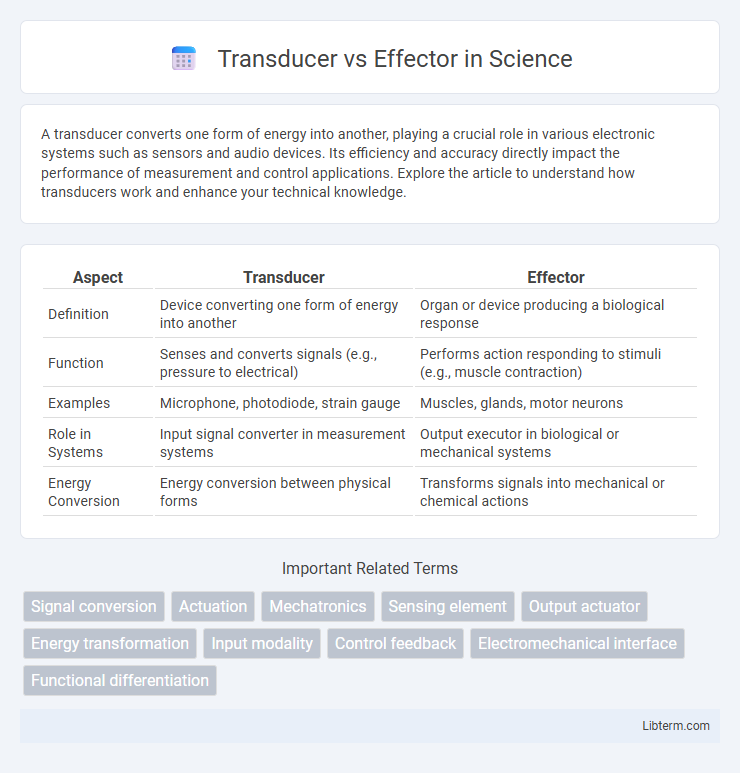A transducer converts one form of energy into another, playing a crucial role in various electronic systems such as sensors and audio devices. Its efficiency and accuracy directly impact the performance of measurement and control applications. Explore the article to understand how transducers work and enhance your technical knowledge.
Table of Comparison
| Aspect | Transducer | Effector |
|---|---|---|
| Definition | Device converting one form of energy into another | Organ or device producing a biological response |
| Function | Senses and converts signals (e.g., pressure to electrical) | Performs action responding to stimuli (e.g., muscle contraction) |
| Examples | Microphone, photodiode, strain gauge | Muscles, glands, motor neurons |
| Role in Systems | Input signal converter in measurement systems | Output executor in biological or mechanical systems |
| Energy Conversion | Energy conversion between physical forms | Transforms signals into mechanical or chemical actions |
Introduction to Transducers and Effectors
Transducers convert physical signals into electrical signals or vice versa, enabling machines to interface with the physical environment through sensors and actuators. Effectors are devices that carry out actions in response to signals received from the control system, translating electrical inputs into mechanical motion or other changes. Understanding the distinction between transducers and effectors is essential for designing efficient control systems in robotics, automation, and instrumentation.
Defining Transducers: Key Concepts
Transducers convert physical signals into electrical signals, enabling systems to sense environmental changes by detecting variables like temperature, pressure, or light. Core to sensor technology, transducers translate energy from one form to another, commonly used in devices such as thermocouples and strain gauges. Understanding transducer principles involves examining sensitivity, accuracy, and signal conversion efficiency to optimize system performance.
What Are Effectors? Essential Overview
Effectors are biological components that respond to signals by producing a specific action, typically in muscle contraction or gland secretion, playing a crucial role in maintaining homeostasis. Transducers convert various types of stimuli into electrical signals for the nervous system to process, whereas effectors execute the resulting response directed by the central nervous system. Understanding effectors is essential for analyzing how organisms adapt to environmental changes through coordinated physiological activities.
Types of Transducers: Examples and Functions
Transducers convert physical signals into electrical signals or vice versa, with types including sensors like thermocouples for temperature measurement, photodiodes for light detection, and piezoelectric sensors for pressure changes. Actuators, a type of effector, perform mechanical actions in response to electrical signals, examples being electric motors, hydraulic cylinders, and piezoelectric actuators. Together, these devices enable interaction between electronic systems and the physical environment by transforming energy forms and triggering responses.
Types of Effectors: Examples and Functions
Effectors are specialized cells or organs that respond to signals from transducers, initiating a physiological response. Types of effectors include muscles, which contract to produce movement, and glands, which secrete hormones or enzymes to regulate bodily functions. For example, skeletal muscles enable voluntary motion, smooth muscles control involuntary activities like digestion, and endocrine glands release hormones to maintain homeostasis.
Principle of Operation: Transducers vs Effectors
Transducers operate by converting one form of energy into another to enable signal processing or measurement, such as transforming physical phenomena into electrical signals. Effectors function by receiving electrical signals and producing a physical response, often involving mechanical movement or action in systems like actuators. The principle of operation distinguishes transducers as input devices that sense and convert energy, while effectors serve as output devices that execute commands based on control signals.
Key Differences Between Transducers and Effectors
Transducers convert one form of energy or signal into another, enabling sensors to detect physical changes and translate them into readable electrical signals. Effectors receive signals from the control system and perform actions by producing mechanical movement, chemical changes, or other physical responses. The key difference lies in their function: transducers act as input devices transforming energy forms for measurement or control, while effectors serve as output devices executing actions based on control commands.
Applications of Transducers in Technology
Transducers play a critical role in technology by converting physical signals such as temperature, pressure, and sound into electrical signals for processing in various devices. Common applications include sensors in medical imaging equipment, industrial automation systems, and consumer electronics for precise data acquisition and control. Unlike effectors that act to influence the environment, transducers enable accurate measurement and feedback necessary for intelligent system operations.
Applications of Effectors in Automation
Effectors in automation serve as critical components that execute physical actions based on control signals, enabling tasks such as robotic arm movement, conveyor belt operation, and precision assembly. These devices convert electrical or digital commands into mechanical motion or force, improving efficiency in manufacturing, material handling, and process control systems. Unlike transducers that primarily translate physical stimuli into signals, effectors directly influence the environment by performing actions essential for automated workflows.
Choosing Between Transducers and Effectors: Factors to Consider
Choosing between transducers and effectors depends on the specific application requirements, including the type of input or output signals, response time, accuracy, and operating environment. Transducers are ideal for converting physical signals into electrical signals or vice versa, making them essential for sensors and measurement systems, while effectors are better suited for executing actions based on control signals, such as actuators in automation. Consider factors like signal compatibility, power consumption, precision, durability, and integration complexity to ensure the optimal selection for system performance.
Transducer Infographic

 libterm.com
libterm.com